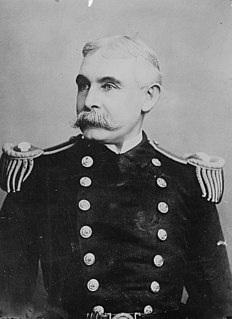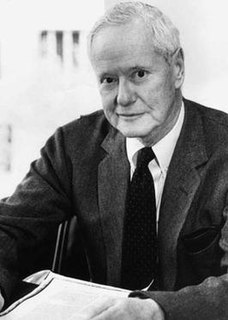A Quote by Johnny Carson
When a comic becomes enamored with his own views and foists them off on the public in a polemic way, he loses not only his sense of humor but his value as a humorist.
Related Quotes
Wherein lies a poet's claim to originality? That he invents his incidents? No. That he was present when his episodes had their birth? No. That he was first to repeat them? No. None of these things has any value. He confers on them their only originality that has any value, and that is his way of telling them.
How frightful a thing it is for the preacher when he becomes accustomed to his work, when his sense of wonder departs, when he gets used to the unusual, when he loses his solemn fear in the presence of the High and Holy One; when, to put it bluntly, he gets a little bored with God and heavenly things.
The American business man cannot consider his work done when he views the income balance in black at the end of an accounting period. It is necessary for him to trace the social incidence of the figures that appear in his statement and prove to the general public that his management has not only been profitable in the accounting sense but salutary in terms of popular benefits.
It is alleged by men of loose principles , or defective views of the subject, that religion and morality are not necessary or important qualifications for political station. When a citizen gives his vote to a man of immorality , he abuses his civic responsibilty. He sacrifices not only his own interest but that of his neighbor, and he betrays the interest of his country.
Only when he has published his ideas and findings has the scientist made his contribution, and only when he has thus made it part of the public domain of scholarship can he truly lay claim to it as his own. For his claim resides only in the recognition accorded by peers in the social system of science through reference to his work.
Start dating someone who is funny, someone who has what in high school you called a "really great sense of humor" and what now your creative writing class calls "self-contempt giving rise to comic form." Write down all of his jokes, but don't tell him you are doing this. Make up anagrams of his old girlfriend's name and name all of your socially handicapped characters with them. Tell him his old girlfriend is in all of your stories and then watch how funny he can be, see what a really great sense of humor he can have.
These books have not made George nobler or better or more truly wise. It is just that he likes listening to their voices, the one or the other, acording to his mood. He misuses them quite ruthlessly - despite the respectful way he has to talk about them in public - to put him to bed, to take his mind off the hands of the clock, to relax the nagging of his pyloric spasm, to gossip him out of his melancholy, to trigger the conditioned reflexes of his colon.
Man is at his furthest remove from the animal as a child, his intellect most human. With his fifteenth year and puberty he comes astep closer to the animal; with the sense of possessions of his thirties (the median line between laziness and greediness), still another step. In his sixtieth year of life he frequently loses his modesty as well, then the septuagenarian steps up to us as a completely unmasked beast: one need only look at the eyes and the teeth.
Wherein lies a poet's claim to originality? That he invents his incidents? No. That he was present when his episodes had their birth? No. That he was first to repeat them? No. None of these things has any value. He confers on them their only originality that has any value, and that is his way of telling them." Mark Twain "...every literature, in its main lines, reflects the chief characteristics of the people for whom, and about whom, it is written.
. . .a sense of humor can be a great help-particularly a sense of humor about (oneself). William Howard Taft joked about his own corpulence and people loved it; took nothing from his inherent dignity. Lincoln eased tense moments with bawdy stories, and often poked fun at himself-and history honors him for this human quality. A sense of humor is part of the art of leadership, of getting along with people, of getting things done.
Man is the only Patriot. He sets himself apart in his own country, under his own flag, and sneers at the other nations, and keeps multitudinous uniformed assassins on hand at heavy expense to grab slices of other people's countries, and keep them from grabbing slices of his. And in the intervals between campaigns he washes the blood off his hands and works for the universal brotherhood of man - with his mouth.

































